This post originally appeared on Murder Is Everywhere.
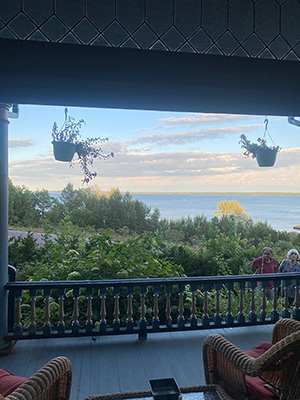
I recently finished writing an honest 5-star review for the charming cottage in East Nashville. As you probably guessed, I booked it through the business website, Airbnb. Isn’t that the first place one consults when looking for an overnight stay far from home? And while I was grateful for a smooth, uneventful stay in an air-conditioned house in what seemed like the hottest city in America, I didn’t feel 100 percent about it.
I am trying to kick the Airbnb habit. But it’s hard. Looking at the photo above, shot from the porch of a Victorian home Airbnb in Bayfield, Wisconsin, you can see how much good luck I’ve had with Airbnb.
Still, I’ve heard a lot of negative chatter about Airbnb this summer. In June and July 2025, local people came together to mount mass demonstrations throughout Europe protesting the rampant and unregulated short-term rental culture in their cities and towns. It happens like this. Tourists and digital nomads blow into town during good weather—which in Southern Europe, can run most of the year. They book themselves into apartments for anywhere from a few days to six months. These mostly-millennial and Gen Z folk can pay rents that are sometimes quadruple the regular rate for long-term local renting.
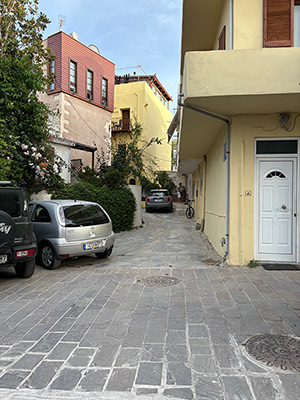
This desperate situation has arisen because landlords are commonly evicting long-term tenants to turn ordinary flats into souped-up temporary rentals. Local people on salaries that might have allowed for 500 euros rent per month maximum are out in the cold. Now they may have to move from their hometowns to cheaper places, live in cars, or stay with their parents forever. In Crete and on other Greek islands favored by tourists, locals often can only find apartment rentals for 8 or 9 months of the year—the non-tourist months. I’ve seen news reports where Greek and Spanish working people have become homeless and live in their cars. A similar housing crisis is playing out in Dublin, Ireland, not only for reasons of tourism and nomadic workers, but because of mass permanent migration of wealthy foreigners taking advantage of low taxes.
Especially in Barcelona, the summer protests have involved firing flares and water guns at hotels, tourist vehicles and even some cafes where tourists are sitting. There have been less in-your-face protests in the Netherlands, Greece, Italy and Portugal. This is a spread from similar tourist protests in Spain in 2024. Many tourists staying in countries during the protests have expressed an uncaring attitude, usually reciting the old cliche that foreign dollars make these countries prosper. Some people prosper, to be sure. But not the everyday Joe.
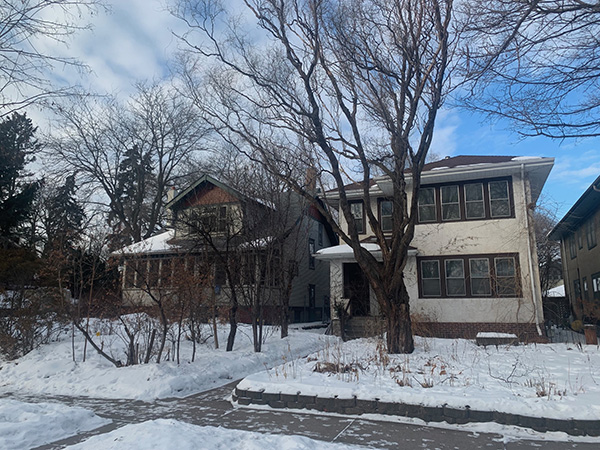
In the US, short term rental housing companies include the company VRBO (Vacation Rental By Owner) and others in addition to Airbnb. And this tourism option has impacted lots of cities, including my childhood hometown of St. Paul, Minnesota. In St. Paul, downtown hotels are losing business, because businesspeople travel less frequently, and the parents visiting the area’s college kids have the chance to stay a few blocks away in historic houses like the one pictured above, where I stayed in 2022 during a chilly weekend. In a variation of this concerned college-parent theme, I booked the Nashville cottage in order to have four or five days to help my college-bound son find and lease his first apartment. I liked staying in a quiet place with free parking and no buses full of drunken bridesmaids.
Neel and Tony and I found him an apartment, but it was expensive than I expected. In Nashville, most apartments seemed to be in the $1800 to $3000 price range. Wistfully, Tony and I recalled an era when rental prices didn’t rival house mortgages. In the mid-1990s, we rented a 2 BR, 2 BA apartment in a large 1920s Baltimore building for $1000 a month plus utilities, with just two washers and dryers for everyone to use in the haunted basement. We rose early to find a free machine to wash clothes, but we did manage to save money and buy our first house six years later.
We really liked our apartment, but we absolutely loved our first house, and the two that have since followed. Houses have personalities and quirks that feed into the allure of staying overnight somewhere, in privacy.
There’s a bit of a gamble with each Airbnb. I punch in a code, turn a knob and hope that the place matches the pretty website photos. I feel lucky when the place is lovely, filled with comfy sofas, tasteful art, and more than one bed and bathroom. There also have been times when the place I booked reeks or has uncomfortable bedding, anemic plumbing and no more than a two plates and two glasses in the cabinet. And what about the always-recording Alexa device left plugged in? Warning: if you leave a critical review about any of this on Airbnb, the owner might get their revenge by grading you as a terrible guest.
During our recent two-week-long trip to Greece, Tony and I traveled widely. We stayed in three small hotels, but we started off with four nights in an Airbnb in Chania, Crete. Our abode was a tiny, traditional house just one room wide with a steep, winding staircase that went up three stories. It was a blessing to have a separate floor to tiptoe down to during restless nights with jetlag. More recently, in the East Nashville Airbnb, we enjoyed morning coffee on the back porch overlooking a yard and forested area. A good house, stocked by a caring person for guests, is a haven.
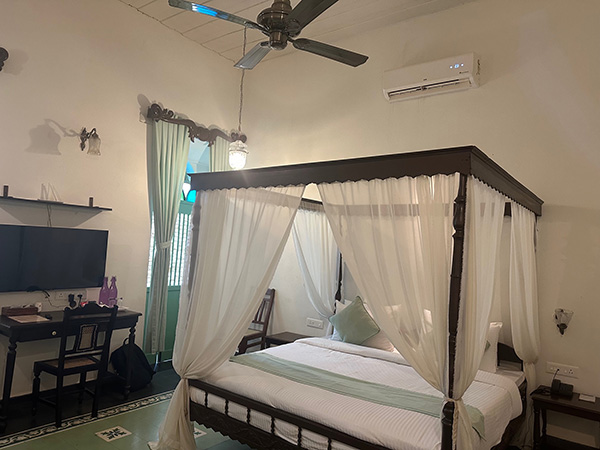
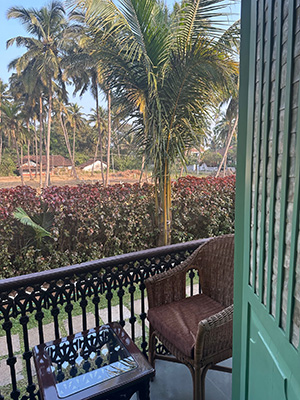
Airbnb meant “air bed and breakfast” originally. The first Airbnbs I heard about were spare rooms in someone’s apartment. This type of arrangement is similar to being a “Paying Guest” in someone’s bungalow in India, or pensione in Italy, or domatia in Greece. And speaking of domatia, I remember fondly staying in several during travels to the Cyclades back in the late 1980s. In the pre-internet days, the only method the owners could attract you was by coming in person to the port, calling out, and holding up signs with photos of the lodging.
I find the advantage to a true homestay is the cultural connection with its owners who can help you in so many ways. We were saved by the kindness of our Airbnb owner in Chania, who did live next door and communicated in Greek with the local airport to deliver our lost luggage. It seemed to me that the little house we stayed in was probably family property, rather than investment, because she told me that her electrician husband had done all the complex lighting in the house. However, a faraway management company had come to handle the bookings and billings in recent years.
Here I am, pondering whether there is any chance for change—or if this is an inevitable, permanent reshaping of who gets to live where. Can governments fix this for the better? And what would shift things to send more tourists into hotels and thus save lodging for year-round people?
Hilton and Marriott have been offering for years all-suite hotels that are budget- and family-smart, but rather short on charm. Different hotels could reshape their existing infrastructure to include more genuine, two- and three-room suites with homey features—including coffeemakers and microwaves, which seem to vanish the more a room costs. And why can’t a good hotel have some washers and dryers, now that same-day laundry valet isn’t always offered?
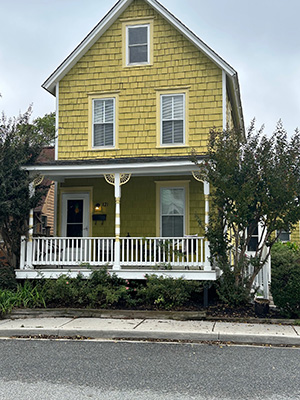
Inevitably, travelers press on. We can dare to make our journeys with the intent to speak at least a few words of the local language, and to perhaps stay in towns where there aren’t too many of us. I acknowledge there are some countries and towns where Airbnbs aren’t such a drain on the local housing market, and renting one’s house might be important income for someone who doesn’t have paying work. It’s just that when a particular town becomes too famous and too popular, that the problems begin.
Right now, I am in the slow-planning stage of various trips to the United Kingdom, Greece, and Spain. This time, I’m researching smaller hotels and actual bed-and-breakfasts. Do B&Bs still exist? If you know a good one, tell me.
